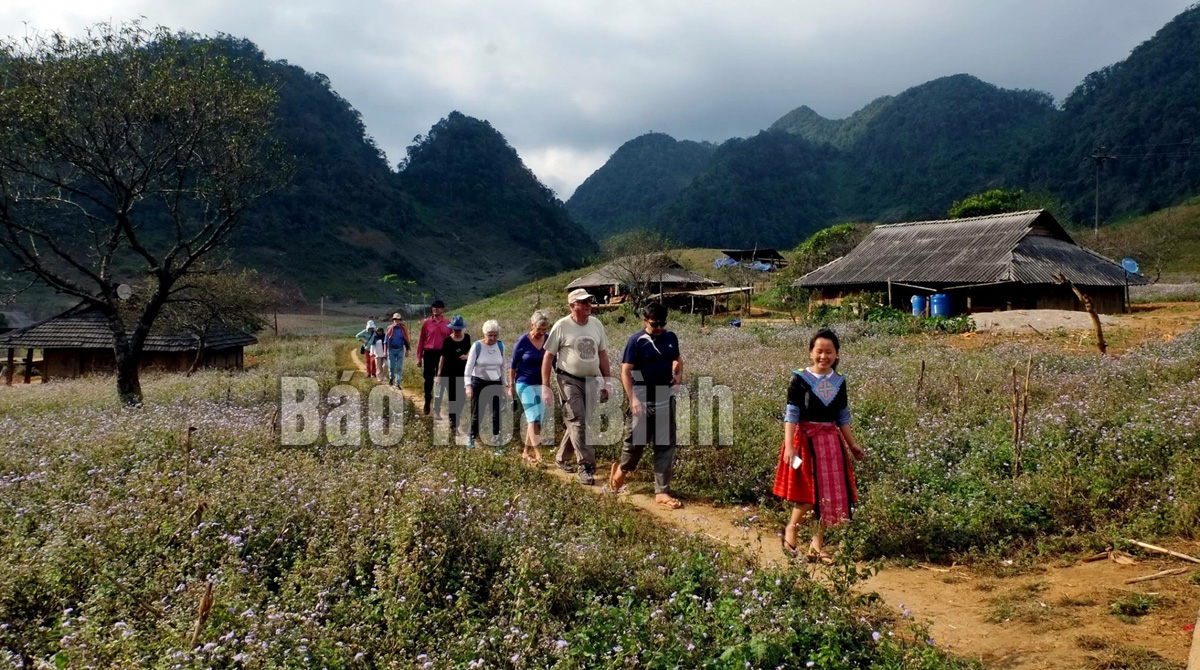
(HBO) – Hang Kia-Pa Co communes in Mai Chau district have 90 percent of their population being Mong ethnic minority people. Each year, local residents celebrate their Independence Festival from August 25 with colourful costumes and flowers decorated along streets. However, this year, due to COVID-19 pandemic, Mong people in Mai Chau have not gathered in traditional markets but celebrated the special event right at home. Amid the complicated development of the pandemic, they have been encouraged to enjoy the festival with strict implementation of pandemic prevention and control measures.
.jpg) Visitors are enjoying
Independence Festival in a Mong village in Hang Kia commune (Mai Chau).
Visitors are enjoying
Independence Festival in a Mong village in Hang Kia commune (Mai Chau).
Sung A Mang, a local in Pa Co Lon hamlet of Pa Co commune said that every year
on the National Day (September 2) occasion and major events of the year, local
families often kill pigs, buffaloes and chickens to offer to their ancestors.
Prior to the main festival day, people in hamlets and villages opened joint
parties by contributing chickens, pigs, rice andenjoyed the festival
together.
However, this year, due to COVID-19, the festive atmosphere
is not the same as the previous years with massive gatherings being cancelled.
But still, Mong people are still enjoying their traditional festival with
simple but cozy family meals, while maintaining their regular production
activities.
Sung A Chua, Vice Chairman of the People’s Committee of Pa Co said that this
year, the Independence Festival does not include entertainment and festive
activities. However, through communications, all local residents understand
that to protect the health of themselves, their families and the community,
they should join hands to prevent the pandemic from entering the locality and
maintain socio-economic development.
Currently, per capita income of Hang Kia and Pa Co has reached 13 million VND
and 15 million VND each year, respectively. As of the end of June 2021, the
ratio of poor households was brought down to 24.7 percent in Hang Kia and 22.5
percent in Pa Co. Both communes have completed 13 out of 19 criteria of a
new-style rural area. Cultural and education infrastructure in the localities
have been improved to meet new-style rural area standards, while
defence-security situation has been ensured, with reinforced political
system./.
With an increasingly vibrant and widespread emulation movement aimed at building cultured residential areas and cultured families, Yen Thuy District has been making steady progress toward improving both the material and spiritual well-being of its people, while fostering a civilized, prosperous, beautiful, and progressive community.
Once lacking recreational spaces and community facilities, Residential Group 2 in Quynh Lam Ward (Hoa Binh City) has recently received attention for the construction of a new, spacious, and fully equipped cultural house. The project followed the model of state support combined with public contributions in both labor and funding.
The "All people unite to build cultural life" movement, which has been effectively integrated with Kim Boi district’s socio-economic development goals, is fostering a lively spirit of emulation across local residential areas, hamlets, villages, public agencies, and enterprises. In addition, through the initiative, traditional cultural values are being preserved and promoted, while community solidarity and mutual support in poverty reduction and economic development are being strengthened.
A working delegation of the Hoa Binh provincial People’s Committee led by its Permanent Vice Chairman Nguyen Van Toan on June 11 inspected the progress of a project to build the Mo Muong Cultural Heritage Conservation Space linked to tourism services in Hop Phong commune, Cao Phong district.
Born and growing in the heroic land of Muong Dong, Dinh Thi Kieu Dung, a resident in Bo town of Kim Boi district, in her childhood was nurtured by the sweet lullabies of her grandmother and mother. These melodies deeply imprinted on her soul, becoming an inseparable part of her love for her ethnic group's culture. For over 20 years, this love for her hometown has driven Dung to research, collect, and pass down the cultural values of the Muong people to future generations.
In the final days of May, the Ethnic Art Troupe of Hoa Binh Province organized performances to serve the people in remote, mountainous, and particularly disadvantaged areas within the province. These were not just ordinary artistic shows, but they were the meaningful journeys aimed at spreading cultural values, enhancing the spiritual life of the people and contributing to the preservation of ethnic minority cultural identities.



.jpg) Visitors are enjoying
Independence Festival in a Mong village in Hang Kia commune (Mai Chau).
Visitors are enjoying
Independence Festival in a Mong village in Hang Kia commune (Mai Chau).